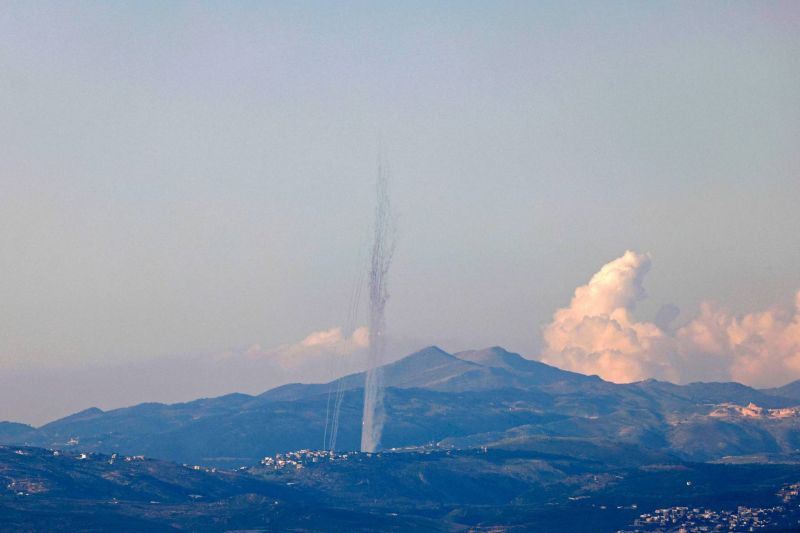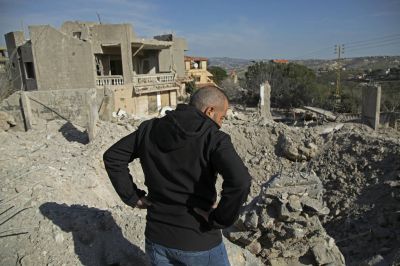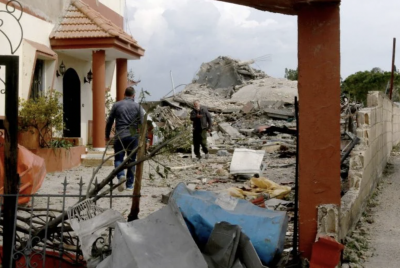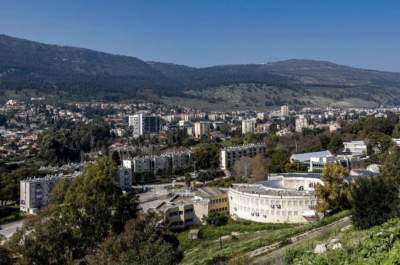
A rocket fired from Lebanon towards Israel, Feb. 26 2024 (Photo Jalaa MAREY / AFP)
The shadow of a total war between Israel and Hezbollah has been hovering since Oct. 7.
The possibility that Israel will launch a full-scale operation in Lebanon seems to have grown in recent weeks. Why?
Most recent details
Cited by CNN, members of the US administration and intelligence service fear that Israel will launch a ground operation in Lebanon at the end of spring or the start of summer if diplomatic negotiations do not succeed.
The timing
It is the first time in weeks that Washington has shown such alarm regarding the risks of a total war between Israel and Hezbollah. This indicates that the Israelis are clearly preparing for an offensive, but it does not necessarily suggest that they have already made their decision. This kind of message may also aim to increase pressure against Hezbollah to accelerate negotiations.
Israel's position
Israel is haunted by the idea that Hezbollah, particularly its elite Radwan Force, specializing in infiltration operations, might one day launch an attack similar to Hamas's on Oct. 7 last year. The Israeli state wishes for the party to be pushed as far away as possible from its border, at least 10 to 15 kilometers, ideally up to the Litani River.
Israel also seems to consider that it has a unique opportunity to weaken its enemy and, more broadly, the entire "Axis of Resistance."
Tens of thousands of civilians have been displaced on both sides of the border, which could facilitate operations. Moreover, according to a recent poll by the Maariv daily, 71 percent of Israelis support a large-scale operation against Hezbollah.
The Israeli war cabinet appears to be more divided. Among the influential voices, Defense Minister Yoav Gallant has been supportive since Oct. 7. Benny Gantz and Gadi Eizenkot seem inclined to give diplomacy a chance. Prime Minister Benjamin Netanyahu is playing both hot and cold.
The position of Hezbollah
Hezbollah does not want a total war with Israel. The "support front" for Hamas has already cost it dearly and puts the group in a delicate position. The Israeli state is expanding its operations in several regions of Lebanon, which weakens the deterrent capacity of Hezbollah.
Hezbollah has not closed the door to an agreement with Israel. It speaks more about a new balance of deterrence. However, it refuses to engage in negotiations before the war in Gaza ends. And its room for maneuvering will likely be more limited if Hamas is militarily defeated in Gaza.
Where do the negotiations stand?
France has made a proposal which notably includes a ceasefire, a withdrawal of Hezbollah to ten kilometers from the border, and a deployment of the Lebanese army in the area.
This proposal has not been well received by Hezbollah, which considers it to be overly favorable to Israel.
It also does not seem to have the support of Washington, which believes that it is not possible to resolve the situation at the Israeli-Lebanese border before the end of the Gaza war. Negotiations will apparently focus on a withdrawal of Hezbollah as far away from the border as possible in exchange for an Israeli withdrawal from occupied territories.
What could an Israeli operation look like?
Initially, Israel could intensify its bombardments in southern Lebanon and target key Hezbollah infrastructure in other regions. Subsequently, a ground operation would seem necessary if they aim to establish a security zone in southern Lebanon. However, the third phase appears much more challenging to envisage. In the event of an Israeli offensive, Hezbollah would escalate attacks against enemy soldiers and launch tens of thousands of missiles and rockets (it is estimated to possess around 150,000) towards Israel. Hezbollah has the capability to target key infrastructure and major cities within Israel. On the ground, it can conduct guerrilla operations to wear down Israeli soldiers.
It will likely receive support from other forces from Syria, Iraq, Iran or Yemen, providing strategic depth and logistical and armament support.
Israel will not have the green light from the United States to launch its operation. It may hope that Washington will be forced to support it once launched, but in any case, it will have a significant political and diplomatic cost, both vis-à-vis Western countries and Arab states.
Israel faces the following dilemma: How would Israel withdraw once its soldiers have set foot on Lebanese soil? And how would they contain this war in terms of space and time?
What's next?
If a cease-fire is declared in Gaza before the beginning of Ramadan, the key question is will it be respected in Lebanon? Hezbollah seems to say yes, while Israel seems to say no. The continuation of fighting would be a very bad sign. It will be much more difficult, if the opportunity arises, to restart diplomatic negotiations.
This article originally appeared in French in L'Orient-Le Jour.


